Genes
Genes are the basic physical and functional unit of heredity. They are made up of DNA and act as instructions to make molecules called proteins. These proteins perform most of the functions in our bodies. Genes come in pairs - one from each parent, and they determine traits such as eye color, blood type, and predisposition to certain diseases.
Structure of Genes
A gene is a specific sequence of nucleotides in a DNA molecule. Nucleotides are the building blocks of DNA and consist of a sugar, a phosphate group, and a nitrogenous base. The sequence of these nitrogenous bases (adenine, thymine, cytosine, and guanine) in a gene determines the genetic code.
Function of Genes
Genes carry the instructions for making specific proteins, which are essential for the structure and function of cells in the body. These proteins determine an individual's traits and characteristics, as well as playing a role in metabolism, growth, and development.
Study Guide for Genes
- What are Genes?
Genes are the basic physical and functional unit of heredity, made up of DNA and containing instructions for making proteins. - Structure of Genes
Genes are specific sequences of nucleotides in a DNA molecule, with the sequence of nitrogenous bases determining the genetic code. - Function of Genes
Genes carry instructions for making proteins, which are essential for the structure and function of cells in the body, determining an individual's traits and playing a role in metabolism, growth, and development.
Understanding genes is fundamental to comprehending how traits are passed from parents to offspring and how variations occur within a population. It also provides insights into genetic disorders and the development of new medical treatments and technologies.
Feel free to reach out if you have further questions or need additional information!
[Genes] Related Worksheets and Study Guides:
.◂Science Worksheets and Study Guides Sixth Grade. Introduction to Animals

 Activity Lesson
Activity Lesson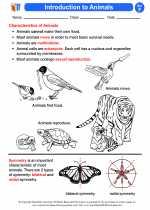
 Worksheet/Answer key
Worksheet/Answer key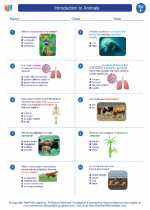
 Worksheet/Answer key
Worksheet/Answer key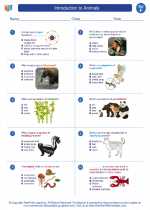
 Worksheet/Answer key
Worksheet/Answer key
 Vocabulary/Answer key
Vocabulary/Answer key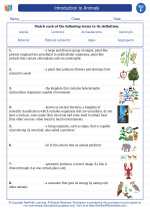
 Vocabulary/Answer key
Vocabulary/Answer key
 Vocabulary/Answer key
Vocabulary/Answer key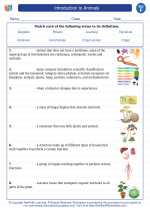
 Vocabulary/Answer key
Vocabulary/Answer key
